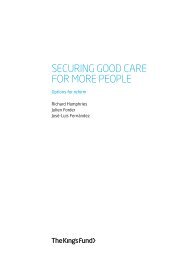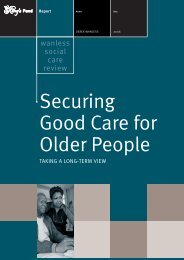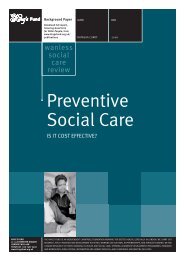Time and other inputs for high quality social care - The King's Fund
Time and other inputs for high quality social care - The King's Fund
Time and other inputs for high quality social care - The King's Fund
Create successful ePaper yourself
Turn your PDF publications into a flip-book with our unique Google optimized e-Paper software.
Evidence from the review<br />
On the basis of the literature search, the author found that the body of literature relating to<br />
community-based <strong>care</strong>, <strong>quality</strong> <strong>and</strong> time-<strong>inputs</strong> appears to be limited. This section sets<br />
out the findings.<br />
Home-based <strong>care</strong> <strong>and</strong> <strong>quality</strong><br />
First to be considered are those papers that relate <strong>for</strong>mal <strong>and</strong> in<strong>for</strong>mal <strong>care</strong>rs’ time-use to<br />
home <strong>care</strong> <strong>quality</strong>. Several studies have investigated unmet needs <strong>for</strong> assistance with<br />
activities of daily living (ADLs) among disabled people who are resident in the community<br />
(Tennstedt et al 1994, Desai et al 2001, Lima <strong>and</strong> Allen 2001). With one exception (LaPlante<br />
et al 2004), these studies do not identify how many hours of particular services would<br />
need to be provided to meet such needs. <strong>The</strong> study by Laplante <strong>and</strong> colleagues analysed<br />
the data from the Disability Follow Back Survey, 1994 <strong>and</strong> 1995, to estimate perceived<br />
unmet need <strong>for</strong> personal assistance services in ADLs <strong>and</strong> instrumental ADLs (IADLs), as<br />
well as the associated shortfall in hours <strong>and</strong> adverse consequences resulting from lack of<br />
help. Overall, those needing help with two or more ADLs <strong>and</strong> reporting unmet needs<br />
received 56.2 hours of help per week <strong>and</strong> were estimated to need 16.6 extra hours of help<br />
per week. Within this category, those living alone <strong>and</strong> needing help with two or more ADLs<br />
had 24.1 hours per week with needs <strong>for</strong> an estimated 18.7 additional hours per week<br />
(confidence intervals (CI): 12.3–25.1); whereas those living with <strong>other</strong>s <strong>and</strong> needing help<br />
with two or more ADLs received 66.1 hours but were estimated to need an additional 16.0<br />
hours per week (CI: 7.7–24.4) – a relative shortfall of 19.5 per cent. <strong>The</strong> authors of the study<br />
remark that: ‘People who live alone <strong>and</strong> have unmet needs fare worse than people with<br />
unmet needs who live with <strong>other</strong>s, <strong>and</strong> both groups are more likely than those whose<br />
needs are met to experience adverse consequences, including discom<strong>for</strong>t, weigh loss,<br />
dehydration, falls, burns, <strong>and</strong> dissatisfaction with the help received.’ (LaPlante et al 2004,<br />
p 598)<br />
<strong>The</strong>re have been a number of studies reporting the levels of community services received<br />
by those with dementia <strong>and</strong> the associated costs (Banerjee <strong>and</strong> Macdonald 1996,<br />
McNamee et al 2001, Kavanagh <strong>and</strong> Knapp 2002, Schneider et al 2002, Wolstenholme et al<br />
2002, Robinson et al 2005) but these do not report on whether the intensity of the services<br />
<strong>and</strong> the hours received are adequate <strong>for</strong> <strong>quality</strong> <strong>care</strong>. A paper by Philp <strong>and</strong> colleagues<br />
(1995) relates tangentially to the provision of ‘adequate’ <strong>care</strong>, reporting service receipt by<br />
older people with dementia as reported by their <strong>care</strong>givers, compared to a matched group<br />
of older people without dementia. As part of this study, the researchers asked <strong>care</strong>givers<br />
how many hours of support a week they would like from three generic service types:<br />
personal <strong>care</strong>, help with housework, <strong>and</strong> relief from supervising the older person. <strong>The</strong><br />
group of <strong>care</strong>givers to those with dementia expressed a need <strong>for</strong> a median of 3 (interquartile<br />
range (IQR): 0–4) hours a week relief from supervising the person with dementia,<br />
whereas the comparison group expressed a need <strong>for</strong> a median of 0 hours (IQR: 0–0).<br />
EVIDENCE FROM THE REVIEW 5
















